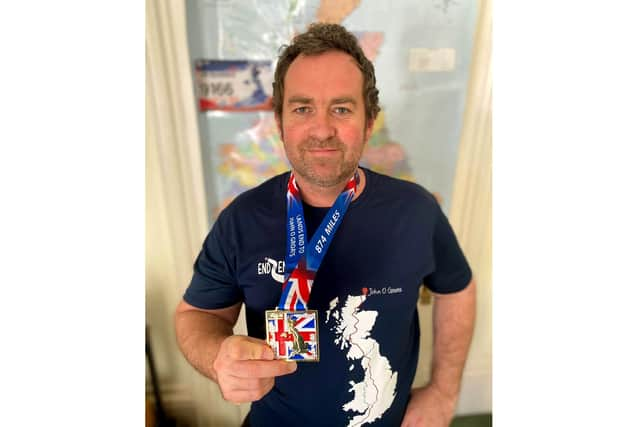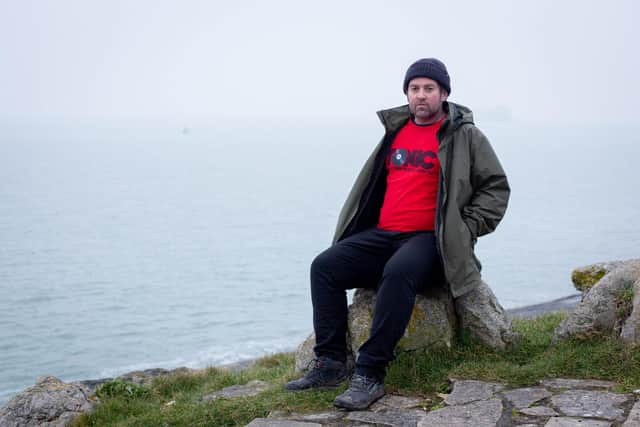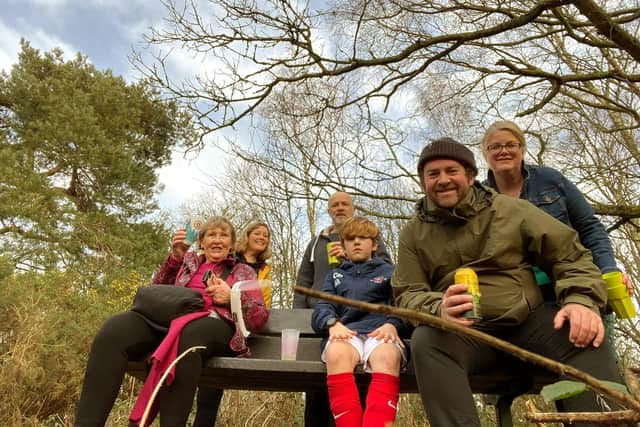Why this Southsea man walked 874 miles around Portsmouth
and live on Freeview channel 276
By car, the journey from Cornwall to Scotland would take 14 hours and 52 minutes.
However, if you wanted to walk such a distance, you’re looking at clocking up more than two million steps on your pedometer.
Advertisement
Hide AdAdvertisement
Hide AdAnd that’s exactly what Southsea’s Jim Barber did, when he took part in a virtual challenge which saw him walk the distance of Lands End to John O’Groats (LEJOG) around Portsmouth to raise money for the charity, Tonic.


Swollen feet, broken toenails and two months later, Jim, 45, has raised more than £4,200 for Tonic – a charity he holds dear to his heart.
This crazy challenge, which meant he was walking for more than six hours each day for 90 days, kicked off on November 23, 2020, and finished on February 21, 2021.
Jim – who works as a participation lead for Fair Ways, Portsmouth – says: ‘A friend of mine recommended the challenge which is run by a company called End to End. You can track your walks on Strava and then see online where you would be on the journey from Lands End to John O’Groats. They would send you postcards and information about the places you would have seen, it was very interactive.
Advertisement
Hide AdAdvertisement
Hide Ad‘Most people do the challenge in one year, which would be walking 2.4 miles a day which is relatively easy to do. However, I wanted to do 16 miles per day which was 112 miles each week.’


When he started this challenge, Jim chose to fundraise for Tonic, the music for mental health charity which is based in Southsea. Jim explains: ‘I have been a musician for 25 years and understand first-hand the lifestyle choices associated with the music industry and how it can contribute in having a negative impact on your mental health.’
In 1995, Jim experienced an alcohol and drug-induced psychosis at the age of 19 and was sectioned under the Mental Health Act. He says: ‘The negative stigma and language often associated with a person's mental health back then definitely contributed and prolonged my recovery with the anxiety and depression that followed.
‘In the 25 years since I have mostly maintained good mental health and I’m glad to see attitudes have changed and people are more openly talking about it, especially in men.’
Advertisement
Hide AdAdvertisement
Hide AdDuring lockdown, Jim admits he was probably drinking too much and eating too many takeaways. ‘I was staring at a computer all day and this challenge held me accountable and kept me motivated to get outside,’ he adds. ‘I would get up for a walk, whatever the weather, and turned this lockdown into something positive.’


Starting his day at 5am, Jim would fit a 10-mile walk into his morning before he was at his desk at 9am. Alongside the incredible support Jim had from his partner, Claire, and son, Cohen, he also set up a Facebook page called ‘Jim’s Road to Somewhere’ which was liked by more than 300 people.
He says: ‘The support I had on Facebook was incredible. I would conduct some Facebook lives during my walks and upload pictures. I have grown up in Portsmouth and lived here all my life, but I was seeing parts of the city I hadn’t really noticed before.
‘On some of my Facebook lives, I would invite some of my male friends to come with me for stretches of the walks and we would talk about mental health privately or on video. It’s good for men to be able to chat to each other.
Advertisement
Hide AdAdvertisement
Hide Ad‘I even had Lorraine Stanley, who plays Karen Taylor in EastEnders, post a video on her social media supporting me,’ says Jim, smiling.


He admits the challenge became ‘quite bleak’ towards the end, when he was waking up in the dark and walking in freezing temperatures during early February. Jim says: ‘I was trying to do 20 miles a day. I had a really painful ankle at the end of it and two of my toenails fell off.
‘But just knowing that people were donating and the pot was getting bigger and bigger kept me motivated. When you see a beautiful sunrise and are listening to your favourite music or podcast, it didn’t seem too bad.’
The end of Jim’s challenge was celebrated at a very special place for him. He explains: ‘I finished at Petersfield Lake, which is where my dad’s memorial bench is. He died in 2004 suddenly of an aneurysm. I really struggled coping with his death because it was so sudden and did not go to the funeral.
Advertisement
Hide AdAdvertisement
Hide Ad‘We used to go to Petersfield Lake a lot as children and I have very fond memories there. I saved the last two-and-a-half miles to share with my family and we finished at the bench. It was emotional.’
Out of the 3,000 people who signed up for the LEJOG challenge – which most complete in a year, not three months – Jim came 70th.
‘I would definitely encourage anyone to get out walking. Years ago, I would never think of walking that much and would always get a taxi if I could,’ says Jim, who says he is planning more challenges for the future. ‘I will be volunteering for Tonic in the near future and have just qualified as a mental health first-aider. I am so excited about working more closely with Tonic and I think they’re such an inspiring modern charity with such great plans which will benefit so many.’
How Tonic is making a difference
Founded in 2012 to fill the gap of creative support for people experiencing mental health difficulties, the charity was based on the belief that participation in music and the arts can aid recovery from mental illness.
Advertisement
Hide AdAdvertisement
Hide AdThe charity’s first event took place at the Pyramids Centre, Southsea, which organised live music performances by more than 50 performers. A year on and the charity had organised its second event with 1,500 attendees, headlined by Dub Pistols and Terry Hall. This was followed by four gigs at The 100 Club, London.
Tonic offers those struggling with mental health issues the opportunity to partake in music and arts, supporting them on their road to recovery.
The charity runs two choirs – Tonic Ska Choir and Tonic Punk Choir – as well as music workshops which are free of charge.
Just this year, the charity launched the Tonic Rider, which is a programme promoting good mental health in the music industry by providing support both remotely and at venues, including training, mental health guides, peer support and Tonic stands at events.
For more information about the great work Tonic do, go to tonicmusic.co.uk